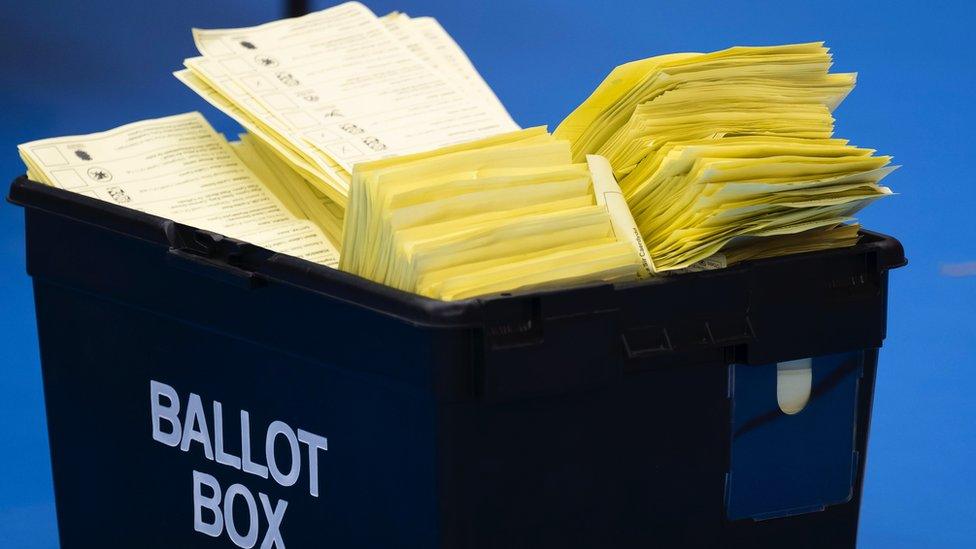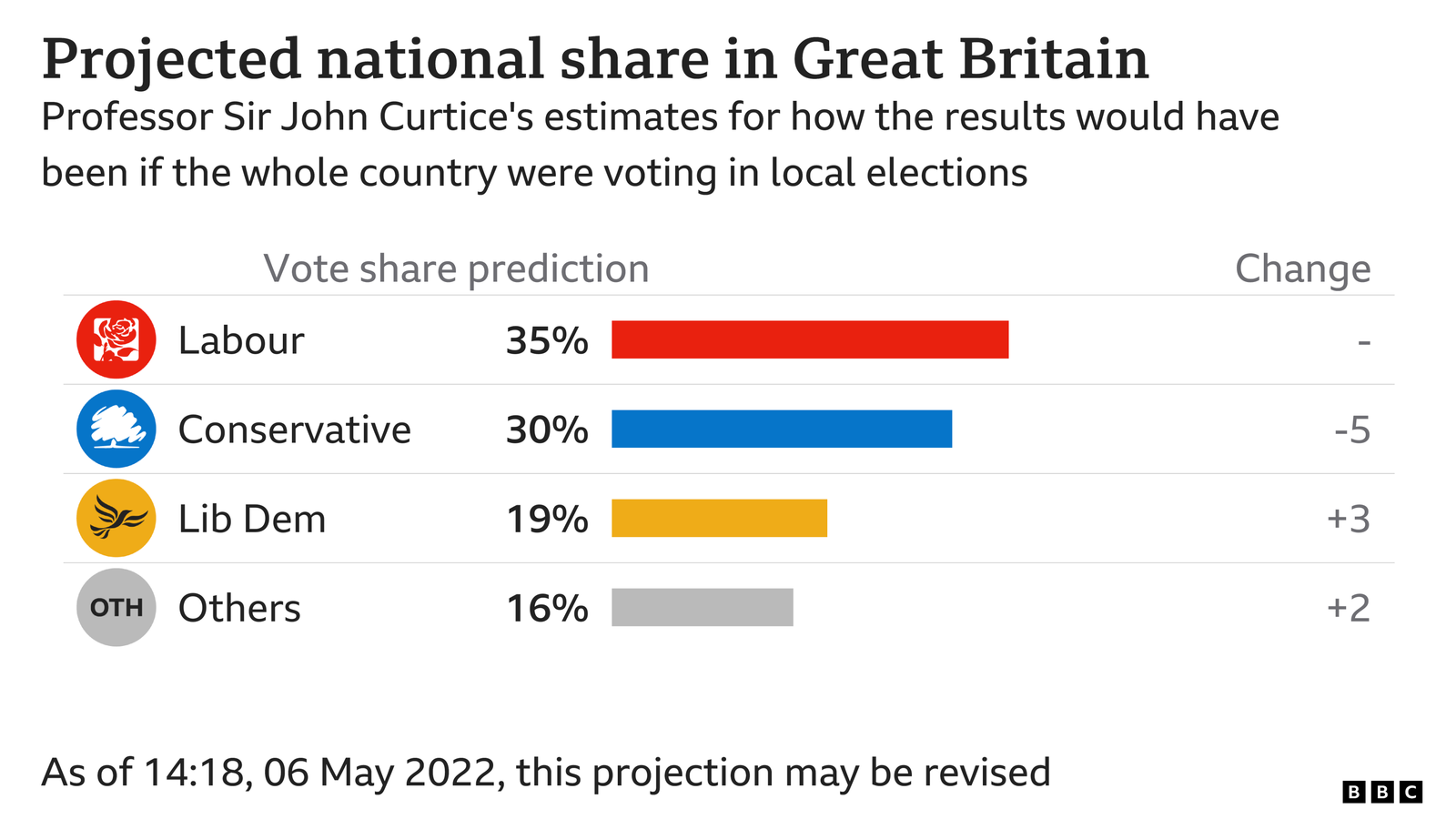Election results 2022: Prof Sir John Curtice on what they show so far
- Published
- comments

Nearly all the councils in England that held an election on Thursday have declared their results, while all the results in Scotland have been published too.
They have produced the much-anticipated reverse in electoral fortunes for the Conservatives. The BBC's projected national share, which estimates what the result would have been if all Britain had been voting yesterday, puts the party on 30%. That represents a six-point drop on the equivalent estimate for last year and is five points down on 2018 when the seats were previously up for grabs.
The results confirm that the party is now electorally weaker than at any point since Boris Johnson won his majority of 80 in 2019.
However, as was also anticipated, this fall in support has not resulted in spectacular losses of seats. That reflects the fact that the Conservatives were defending many fewer wards than Labour. Even so, the loss of nearly 350 seats in England represents about one in four of the seats the party was trying to defend.
Meanwhile, although the party has so far only lost control of 11 councils, among those are the totemic councils of Wandsworth and Westminster, where hitherto the local Tories' low council tax policy had seemingly helped them keep control - even when the national tide was running against their party. Elsewhere in London, Labour have also wrestled Barnet from Conservative control, though Harrow went in the other direction.
Indeed, the results across England indicate that Tory councils with relatively low council tax rates did not perform better at the ballot box - a pattern that the party might want to bear in mind in future local election campaigns.
However, the loss of support for the Conservatives did not simply translate into Labour advance. Although at 35%, its projected share is six points up on last year, it is no better than what the party achieved in 2018 when Jeremy Corbyn was still party leader. The party did no more than maintain its 2018 vote in London, secure a small increase in the South of England, but was down three points in the north of England.
Its tally of just over 50 net gains of seats (most of them in London) is a reflection of the decline in Conservative support rather than of any electoral advance by Labour themselves since 2018.

In fact, the Conservative decline has helped the Liberal Democrats even more than Labour. Coupled with the modest three point increase to 19% in the party's projected national share since 2018, the party has enjoyed a net gain of 200 seats and gained control of Kingston-upon-Hull from Labour and of Somerset and Gosport from the Conservatives.
Of particular note is the average increase of eight points in the Liberal Democrat vote in places where the party started off in second place to the Conservatives, a performance that the party will hope augurs well for winning so-called blue wall parliamentary seats, where the party is breathing down the Conservatives' neck.
Overall, other than the 2019 local elections when the party also scored 19% in the projected share, the result represents its best performance in local elections since it entered into coalition with the Conservatives after the 2010 general election.
However, perhaps the least anticipated success has been that of the Greens in gaining over 50 seats, enough to more than double the party's representation on the councils that had elections on Thursday. The party won an average of 12% in those wards that it fought, up four points on 2018, though not quite matching its previous best ever local election performance in 2019.
Although much concern was expressed before the election that the various recent scandals at Westminster would serve to depress turnout, in the event it was only down by a point or two on other recent local elections. There is no sign that particularly large falls in turnout were occasioned by Tory voters staying at home.
All in all, Boris Johnson might feel that his party's losses have not been as bad as he might have feared. He will doubtless argue that governments often lose ground in the middle of a parliamentary term, and in the past the damage has often been worse than this.
That said, these results illustrate the sharp decline in Conservative support over the last 12 months, not least in the wake of the recent partygate scandal and the ongoing cost of living crisis.
Tory MPs might be particularly concerned about the fact that party's vote fell most heavily in the south of England outside London, where many of them have their seats, and a pattern illustrated by the loss of five councils located south of Birmingham.
Meanwhile in Scotland the party came third behind Labour for the first time since 2016, while the pro-independence SNP and Greens both made progress. That does not seem like a recipe that will help facilitate the party mount a robust defence of the Union.
On the other hand, Tory MPs may feel comforted by Labour's failure not to make more progress in England than they did.
In any event, the question the party now has to address is how it thinks it can best regain the ground that it has lost before the next general election, a contest which now may be less than two years way.
Which councils have changed hands?
Your device may not support this visualisation
This story was written together with the BBC's psephological team of Patrick English, Stephen Fisher, Robert Ford and Eilidh Macfarlane.

LAURA KUENSSBERG: A night of jubilation and disaster? Not quite
POSTCODE SEARCH: What are the results in my area?, external
NORTHERN IRELAND: Full results, external
SCOTLAND: Full results, external
WALES: Full results, external

